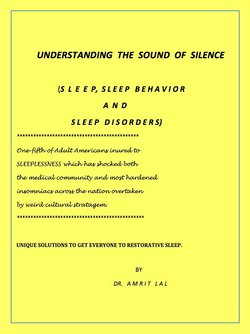Читать книгу Understanding the Language of Silence - Sleep, Sleep Behavior and Sleep Disorders - Dr. Amrit Lal - Страница 22
На сайте Литреса книга снята с продажи.
RISK OF CANCER AND NEUROLOGICAL DISORDERS
ОглавлениеRisk of cancer may also go up in people who are sleep deprived. A Japanese study of nearly 24,000 women ages between 40 to 79 years found that those who slept less than six hours a night were more likely to develop breast cancer than the women who slept longer. The increased risk may be associated with decreased secretion of melatonin hormone. Among participants in the famous Nurse Health Study in the United States, Eva S. Schernhammer of Harvard Medical School also finds a link between low melatonin and increase risk of breast cancer. In another study involving post-menopausal women with breast cancer who routinely slept less than 6 hours a night may be twice as likely to have more aggressive breast cancer compared with those who slept longer, lead researcher, Cheryl Thompson, Ph.D., of Case Western University at Cleveland, Ohio, U.S., concluded “Cancer is a disease of mistakes in our DNA. Sufficient sleep is responsible for maintaining circadian rhythm, which regulates our body’s natural DNA repair. If that process is frequently disturbed, so is DNA correction.” A good quality of sleep is believed to redress such DNA mistakes.
Much has been reviewed about connection between sleeplessness and neurological disorders like dementia, Alzheimer’s disease and Parkinson disease which may cause irreversible damage to the areas of brain responsible for regulating sleep. Researchers at Washington University School of Medicine in St. Louis, have reported in Journal of American Medical Association (JAMA) Neurology, (March 11, 2013) “sleeplessness precedes Alzheimer’s Disease but do not yet exhibit memory loss or other cognitive problems of full blown disease.” It is a common clinical finding that dementia patients generally have troubled sleep at night, and sleep studies confirm increased fragmentation and sleep onset latency, and decreased sleep efficiency, total sleep time and slow wave sleep. Severity of dementia appears to be associated with the severity of sleep disorder. There is enough evidence to establish that dementia affects sleep architecture differently from the normal aging.
Physiologically speaking, sleeplessness causes increased level of body’s inflammatory chemicals, including C-Reactive protein, tissue necrosis factors and interleukins which are considered precursors of cardio-vascular disease. This has been repeatedly emphasis in the foregoing text.
Sleep is nature’s best analgesia. It is a common observation that sick people, patients after some major surgery and in great pain and those convalesecing sleep longer than healthy people as if their body shuts down to all disturbing distractions to give full attention on healing through sleep. This also underlies the rationale of hospitalizing patients where they can sleep better (and recover faster) without day-to-day tensions and problems.
